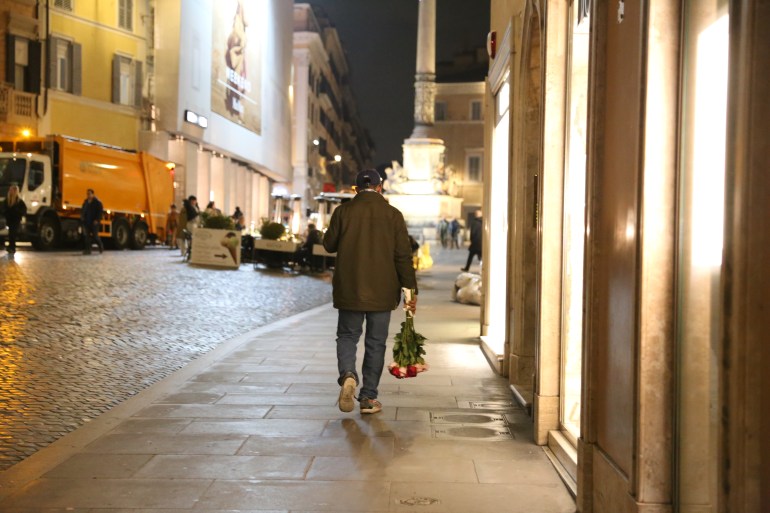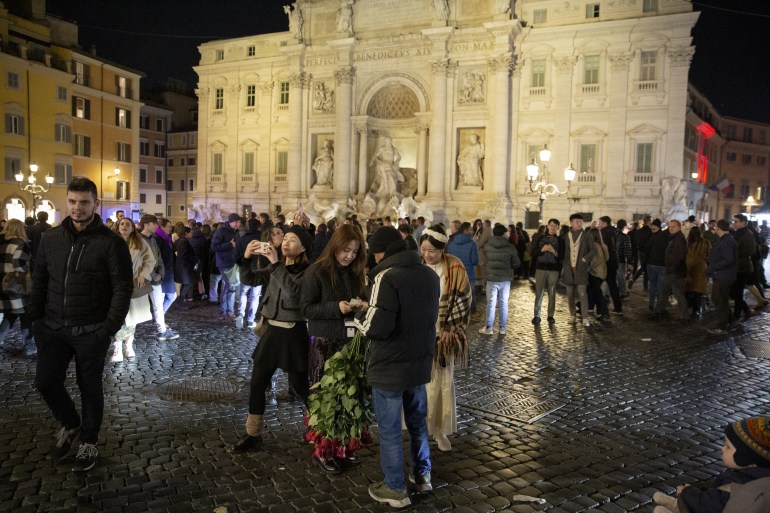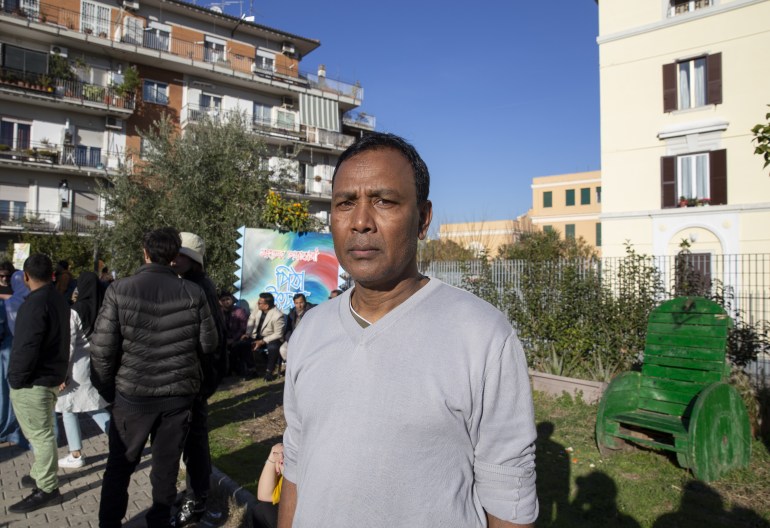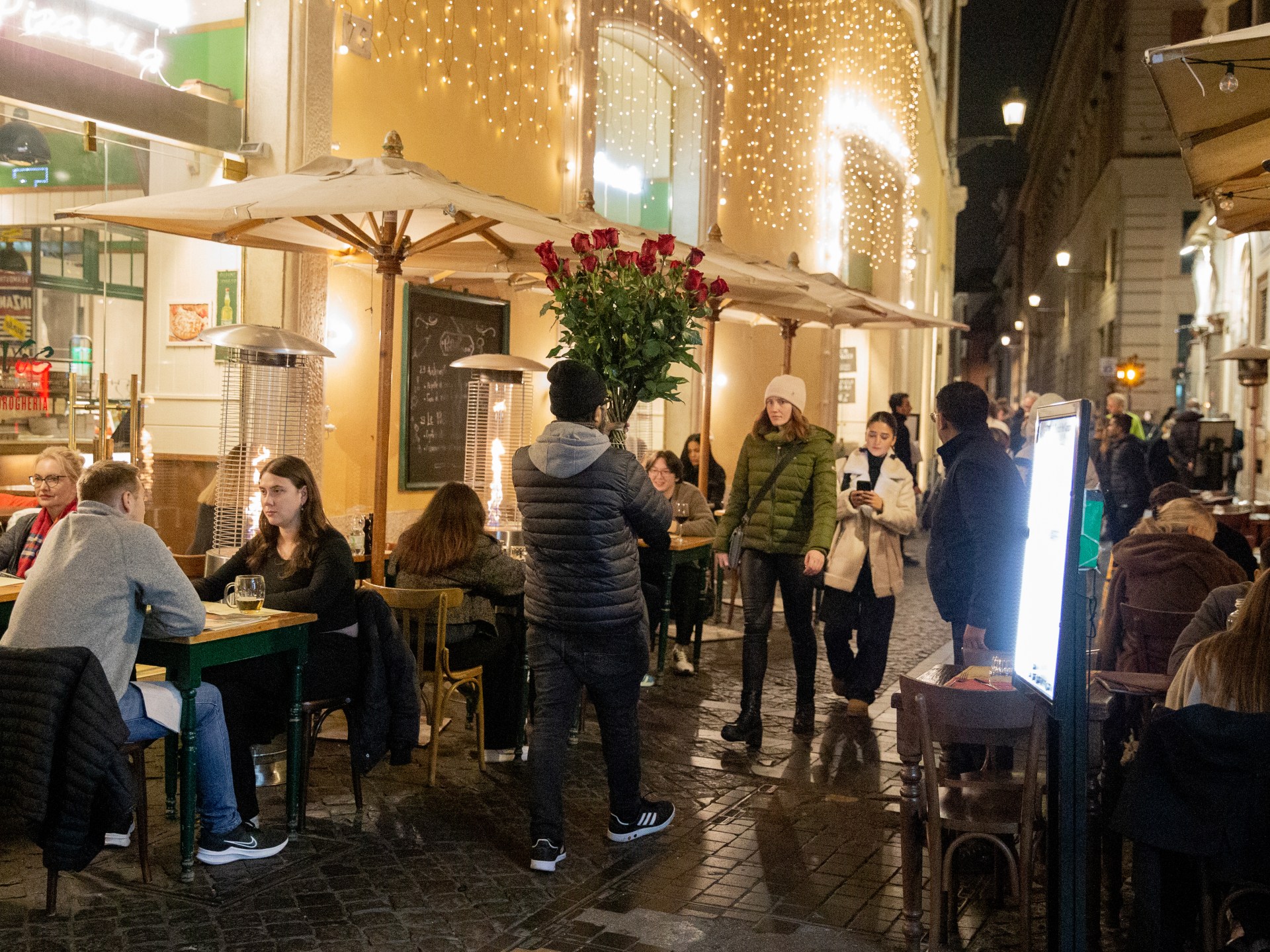Names marked with an asterisk have been changed to protect identities.
After a night of selling roses in Tuscany, Mohammed* was cycling along a seaside road when someone in a passing car hit him on the back with a pole.
He fell to the ground.
It was August 2013 and Mohammed was 22. He believes it was intentional and likely a racist attack.
“I was already broken,” he said. “But after that, I was in pieces.”
He suffered emotionally and still has back pain from the assault today.
He had arrived in Italy a few months earlier following a harrowing seven-month journey via land and sea.
He had no documents or money and owed 9,000 euros ($9,700) to the Bangladeshi agents who had arranged his trip.
Mohammed says he was guided by multiple people along the way.
When he arrived in Tuscany, he was approached by men from his country who, he says, put him to work selling roses in busy city centres so he could pay for room and board at a house with nine other foreign workers.
“I didn’t like bothering people while they were eating to ask them if they wanted to buy a rose from me,” said Mohammed. “But I had no choice.”

Rose sellers are a common sight in Italy’s largest and most romantic cities, such as Rome, Milan or Turin.
South Asian men wield bunches of red roses and approach hordes of tourists every night.
During high season, you may see about 20 rose sellers a night spread across the city centre – and dozens more on Valentine’s Day weekend.
But hidden behind the universal symbol of love is a bleak story of hardship, labour exploitation and human trafficking.
On a given night, rose sellers of all ages can walk miles on end, weathering rejection, police scrutiny and even violence to sell a few flowers.
“They are a pain in the ass,” said a Welsh tourist on a February night, at the top of the Spanish steps in Rome.
Despite their familiar presence and the dangers they encounter, there are almost no official records or data about these street vendors.
In recent years, several attacks on rose sellers in various parts of the country have been reported in local news outlets; they are often carried out by young Italian men.
In November, a 50-year-old Bangladeshi rose seller described as a “well-known face” in Ivrea, Turin, was brutally beaten by a group of three men.
Another Bangladeshi seller was randomly pushed into the Naviglio canal in Milan by two men in 2020.
A year earlier, two young men in Nettuno reportedly beat and robbed a seller whose origin was unknown.
It is unclear what consequences – if any – the perpetrators ultimately faced in each case.
“They are visible to everybody but there is no data. There is nothing,” said Marina Mazzini, who conducted one of the only case studies on rose vendors in Italy for the United Nations Interregional Crime and Justice Research Institute (UNICRI).
For this article, as well as Mohammed, Al Jazeera interviewed two other rose sellers, three former vendors and four NGOs who have supported dozens of rose vendors with their documentation.
Fear, uncertainty and thankless work
South Asians who end up selling roses in Italy are predominantly from Bangladesh. Nearly all have crippling debts and rely on members of their communities to help them start life in a new country.
Mohammed says he was hosted in Tuscany by a man of Bangladeshi origin and another from Pakistan. On the first day Mohammed was to sell roses, his hosts gave him 30 euros ($32) and told him to go to a local flower vendor to buy them.
The hosts were always in contact with the flower shops to track how many roses each seller bought, Mohammed said.
He says he spent at least 12 hours a night traversing the city’s restaurants, bars, monuments and other tourist hot spots until all the flowers were sold before returning to his hosts’ home, where he would sleep with five others in the same room.

There is no going rate for a red rose. Vendors may ask for a few euros and accept between two and five ($2.16 to $5.40) depending on each sale.
If he made 120 euros ($129) from selling 200 roses on a good night, he would have to give 60 euros ($65) to the flower seller and 50 euros ($54) back to his hosts for room, board and the promise of a good lawyer to get his paperwork in order, Mohammed said. The 10 euros ($11) left were usually spent on cigarettes and a coffee.
Soon, he had trouble sleeping, and started suffering from panic attacks and nightmares about his journey – part of which he says was spent on a ship with 200 other people making their way from Egypt to Sicily.
If local police poked around when he was working, Mohammed was transferred to a different area.
In between selling flowers, he worked at a Bangladeshi grocery store in Genova, where he says his work was never compensated, sold artichokes at a Milan market and sold roses again in southern Italy, while toiling intermittently as a gardener, dishwasher and chef’s assistant.
After about seven years, Mohammed was granted asylum in 2018 as a victim of human trafficking with the help of a local NGO, Comunità Progetto Sud.
Mohammed believes his countrymen let him down.
“A Moroccan helped me to learn Italian and Italians helped me get documents,” Mohammed said. “I have only been exploited by my own people.”
“To the young people who are now coming to Italy, I tell them not to trust their own people,” he added.
Recognising exploitation
Uddin Md Mofiz, 55, who arrived in Rome in 1987, said he was among the first rose sellers in the country. He described his early years in Italy as “very hard”.
“I slept in trains, I slept in cars, I slept at the Termini train station in Rome. At the beginning … all my money went to food and rent,” Mofiz said.
Siddique Nure Alam, the president of a Bangladeshi association in Rome called Dhuumcatu, said he worked with Mofiz and others as a rose vendor 35 years ago. Alam said every street seller who arrived in Italy was already indebted.
But Mofiz and Alam do not view their early hardship as exploitative.
“If I have good arms and legs, I can work. Nothing happens instantly. Things take time. Slowly, slowly, you have to build your life,” Mofiz said.

According to experts, it is difficult to track exploitation among South Asian street vendors because they often do not consider themselves exploited. They rarely seek help, viewing their suffering as a necessary step towards a better future.
“When a Bangladeshi describes his exploitation, he doesn’t call it as such, but instead blames his difficulties on the high cost of living,” said Luca Scopetti, the coordinator of the anti-trafficking section of Parsec, a social cooperative in Rome.
For people under pressure to repay debts and compensate their hosts, “informal work is the only means of survival”, UNICRI’s Mazzini said.
Alessandro Arrighetti, a professor of economics of productive sectors at the University of Parma, said selling roses is a dead-end pursuit.
“The experience you get [from selling roses] does not increase professional skills,” he said.
Rose sellers struggle to learn Italian or move onto a better job, remaining stranded.
“You can stay there for a year, two or even 10 years.”
While Italian authorities have the expertise and means to identify typical victims of human trafficking – such as foreign women forced into prostitution – those at the sharp end of labour exploitation are less visible, according to Francesca Nicodemi, a lawyer specialised in trafficking.
“The numbers of female victims of trafficking recognised as refugees are higher than that of men trafficked for labour exploitation,” Nicodemi said.
As things stand, undocumented workers like Mohammed can only be provided with assistance if they themselves identify as victims of trafficking to Italian authorities, Nicodemi said.
The case will then be examined to determine whether there is a “well-founded fear of persecution” – according to the 1951 Geneva Convention on the status of refugees.
“Mainly, these persons are recognised as ‘economic migrants’ or at least victims of smuggling because they have chosen to arrive in Italy voluntarily,” Nicodemi said.
Even if a rose seller were to lodge a complaint with police, officials may “lack the expertise” to recognise this type of exploitation, said Carla Quinto, the head of legal at the Be Free anti-trafficking cooperative in Rome.
“[This] prevents the person who reports from being recognised as a victim of trafficking for the purpose of labour exploitation,” said Quinto.
In any case, some rose sellers likely believe making 10 euros ($11) a day is better than making nothing, she added.
To effectively help them, exploited migrants must be able to work and have a place to live.
NGOs like Liotti’s and Scopetti’s reach out to undocumented workers to help them recognise their own exploitation and seek asylum.
“Migrants don’t just take but also offer and share their culture,” Mohammed said. “When they arrive, let’s properly identify them and give them opportunities. Let’s see what they bring and what we can offer them because migrants do not bring with them the bad.”
Mohammed eventually beat his fear and depression. Today, he is fluent in Italian and works as a beekeeper, caring for 300 hives.
This article was developed with the support of Journalismfund Europe
Sumber: www.aljazeera.com
 Skip to content
Skip to content

